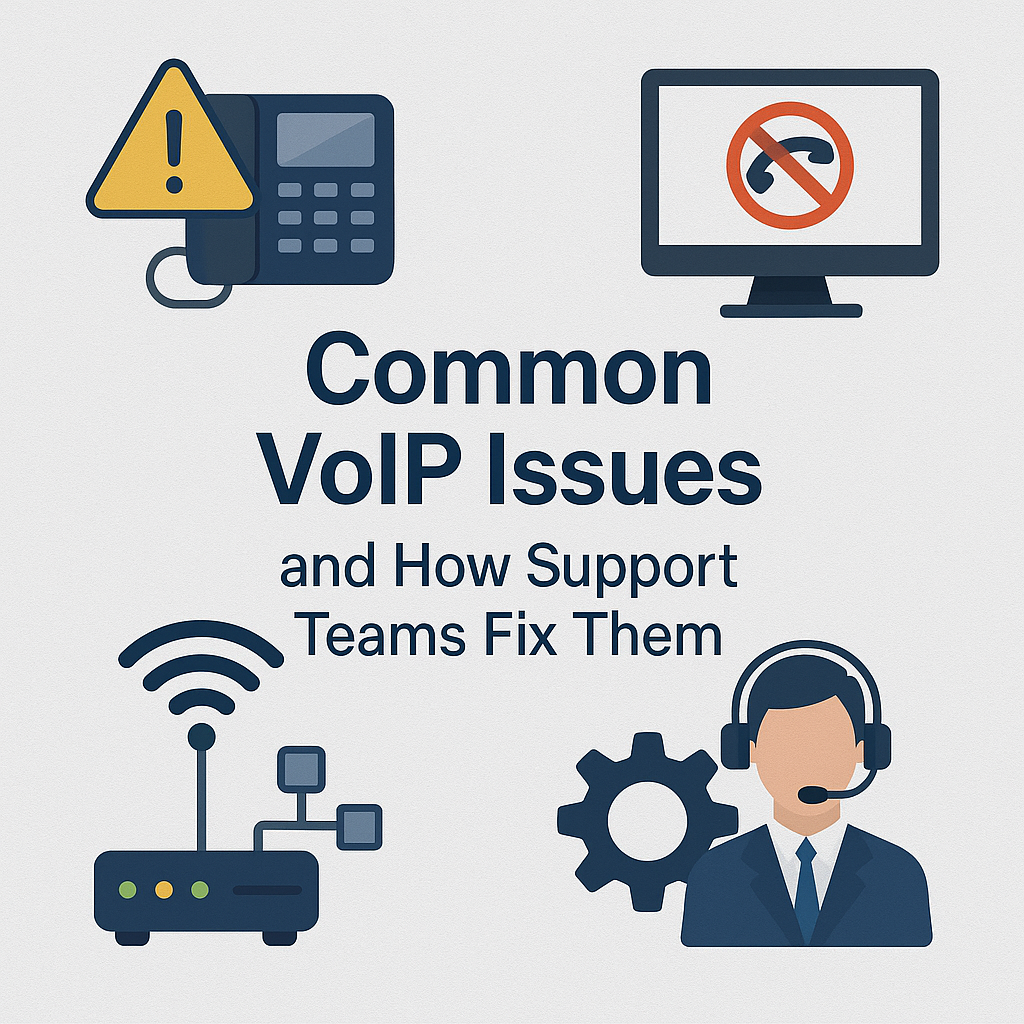Top VoIP Features Every Business Should Leverage

Voice over Internet Protocol (VoIP) technology has revolutionized the way businesses communicate. By enabling voice communication over the internet, business VoIP systems offer cost-effective, scalable, and feature-rich solutions that go far beyond traditional phone systems. For businesses looking to improve productivity and enhance collaboration, leveraging VoIP’s extensive range of features is no longer optional—it’s a necessity. In this article, we’ll explore the top VoIP features every business should leverage and how they can benefit your organization.
What is VoIP and Why Is It Important for Businesses?
VoIP allows businesses to make calls over the internet rather than through traditional phone lines. This digital transformation has made communication more affordable, flexible, and accessible. With advanced features tailored for modern workplaces, VoIP ensures businesses stay competitive and efficient.
Key benefits of VoIP for businesses include:
- Cost savings on local and international calls.
- Scalability to accommodate growing teams.
- Integration with other business tools and platforms.
- Enhanced mobility for remote or hybrid teams.
Top VoIP Features Every Business Should Leverage
1. Auto Attendant
An auto attendant acts as a virtual receptionist, greeting callers and directing them to the appropriate department or individual without human intervention.
- Benefits:
- Reduces the need for a dedicated receptionist.
- Provides a professional first impression.
- Ensures 24/7 availability for customer inquiries.
This feature is particularly beneficial for businesses handling high call volumes, as it ensures prompt and efficient call routing.
2. Call Forwarding and Routing
Call forwarding allows calls to be directed to different numbers or devices, ensuring no call goes unanswered.
- Benefits:
- Enables seamless communication for remote teams.
- Reduces missed opportunities by ensuring calls reach the right person.
- Allows time-based routing, ensuring calls are handled during business hours.
Advanced VoIP systems offer intelligent call routing, which prioritizes calls based on predefined rules.
3. Voicemail-to-Email Transcription
With voicemail-to-email transcription, audio messages are converted into text and sent to your email.
- Benefits:
- Saves time by allowing users to read messages instead of listening to them.
- Enables better record-keeping of customer interactions.
- Allows quick responses, even during meetings or travel.
This feature is ideal for multitasking professionals who need to stay on top of communication.
4. Call Analytics and Reporting
Call analytics provide detailed insights into call volume, duration, and user activity.
- Benefits:
- Helps monitor team performance.
- Identifies peak call times to optimize staffing.
- Tracks customer behavior for improved service strategies.
By leveraging data, businesses can make informed decisions to enhance customer satisfaction and operational efficiency.
5. Video Conferencing
Integrated video conferencing allows teams to conduct virtual meetings seamlessly.
- Benefits:
- Fosters collaboration among distributed teams.
- Reduces travel costs for in-person meetings.
- Enables face-to-face communication for better engagement.
This feature is crucial for businesses transitioning to hybrid or remote work models.
6. Integration with CRM and Business Tools
VoIP systems can integrate with Customer Relationship Management (CRM) tools and other business applications.
- Benefits:
- Streamlines workflows by syncing customer data.
- Enhances productivity by reducing manual data entry.
- Provides better insights into customer interactions.
Popular integrations include Salesforce, HubSpot, and Slack, allowing businesses to consolidate their communication and data management.
7. Call Recording
Call recording allows businesses to save and review conversations for quality assurance, training, and legal purposes.
- Benefits:
- Improves customer service by identifying areas for improvement.
- Provides evidence for dispute resolution.
- Aids in compliance with industry regulations.
This feature is indispensable for industries like finance, healthcare, and customer support.
8. Mobile and Desktop Apps
Most VoIP providers offer apps that allow users to make and receive calls on their smartphones, tablets, or desktops.
- Benefits:
- Facilitates remote work by enabling mobile access.
- Ensures employees can stay connected on the go.
- Offers a unified platform for communication.
These apps often include advanced features like instant messaging and file sharing for enhanced collaboration.
9. Multi-Level IVR (Interactive Voice Response)
A multi-level IVR system allows callers to navigate through multiple layers of menu options to reach the desired department or service.
- Benefits:
- Reduces wait times for customers.
- Automates routine inquiries like account balances or FAQs.
- Enhances the customer experience with self-service options.
IVR is a must-have for businesses with complex customer support needs.
10. Call Conferencing
VoIP systems often include advanced conferencing features for group calls.
- Benefits:
- Facilitates team discussions without requiring additional software.
- Supports collaboration among remote team members.
- Enhances productivity with screen-sharing and file-sharing capabilities.
This feature is essential for businesses that frequently engage in collaborative projects.
11. Scalability and Flexible Plans
VoIP systems allow businesses to scale their communication infrastructure as they grow.
- Benefits:
- Accommodates new employees and locations without significant hardware investment.
- Offers flexible subscription plans for cost optimization.
- Adapts to changing business needs, such as seasonal demand.
12. Advanced Security Features
Modern VoIP systems come with robust security features like encryption, firewalls, and fraud detection.
- Benefits:
- Protects sensitive business and customer data.
- Ensures compliance with data protection regulations.
- Minimizes risks of cyberattacks and eavesdropping.
Security should be a top priority for businesses handling confidential information.
13. Call Queuing
Call queuing ensures incoming calls are organized and handled efficiently during peak times.
- Benefits:
- Reduces customer frustration by managing wait times.
- Prioritizes high-value or urgent calls.
- Enhances overall call center performance.
14. Customizable Caller ID
Customizable caller ID lets businesses display a specific number or name when making outbound calls.
- Benefits:
- Enhances brand recognition and credibility.
- Improves customer trust by displaying familiar information.
- Allows businesses to differentiate between departments or campaigns.
15. 24/7 Customer Support
Leading VoIP providers offer round-the-clock VoIP support to ensure uninterrupted service.
- Benefits:
- Minimizes downtime with quick issue resolution.
- Provides peace of mind for businesses operating across time zones.
- Ensures continuous communication during critical operations.
How to Choose the Right VoIP Provider
When selecting a VoIP provider business, consider the following factors:
- Features and Customization: Ensure the provider offers the features your business needs.
- Cost and Scalability: Evaluate pricing plans and scalability options.
- Ease of Use: Opt for user-friendly systems with minimal training requirements.
- Integration Capabilities: Check compatibility with existing tools and platforms.
- Customer Support: Look for VoIP service providers with reliable and accessible support services.
FAQs
1. What is the primary benefit of VoIP over traditional phone systems?
VoIP significantly reduces communication costs while offering advanced features like video conferencing, call analytics, and integration with business tools.
2. Can VoIP systems handle high call volumes?
Yes, VoIP systems are designed to handle high call volumes efficiently through features like call queuing, IVR, and auto attendants.
3. Is VoIP secure for business communication?
Modern VoIP providers implement robust security measures, including encryption and fraud detection, to protect sensitive data.
4. Do VoIP systems support remote work?
Absolutely! VoIP systems offer mobile and desktop apps, allowing employees to stay connected from anywhere.
5. How does VoIP improve customer service?
VoIP enhances customer service by enabling call recording, voicemail-to-email transcription, and real-time call routing for faster issue resolution.
6. Are VoIP systems suitable for small businesses?
Yes, VoIP systems small business solutions are cost-effective, scalable, and packed with features that cater to small business needs.
Conclusion
VoIP is more than just a communication tool—it’s a comprehensive solution that empowers businesses to enhance productivity, reduce costs, and improve customer satisfaction. With offerings from business telephone providers and the flexibility of business services VoIP, businesses can streamline their communication strategies and stay ahead in today’s competitive market.




No comment